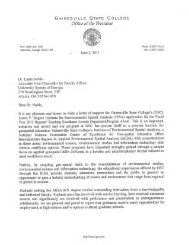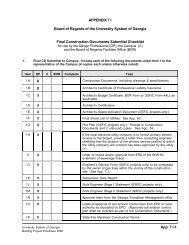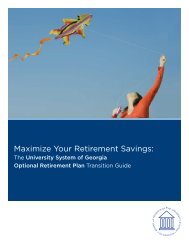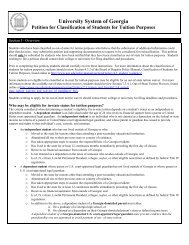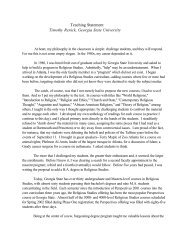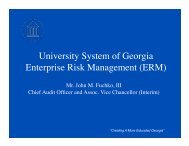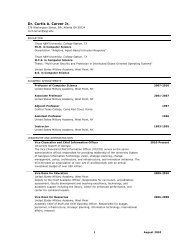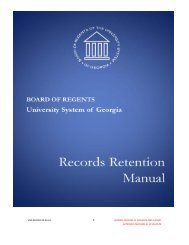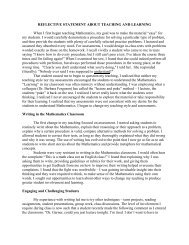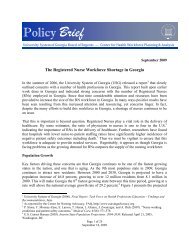66860 Federal Register / Vol. 75, No. 209 / Friday, October 29, 2010 / Rules and RegulationsWReier-Aviles on DSKGBLS3C1PROD with RULES2would have no choice but to pass thatcost on to students.Discussion: We do not agree that§ 600.9 <strong>of</strong> these final regulations willresult in an unfunded mandate by theFederal Government, since many Stateswill already be compliant and optionsare available that should permit otherStates to come into compliance withonly minimal changes in procedures orrequirements if they want to provideacceptable State authorizations forinstitutions. The regulations alsoinclude a process for an institution torequest additional time to becomecompliant. Furthermore, if a State isunwilling to become compliant with§ 600.9, there is no requirement that itdo so. We also do not agree that Stateswill see coming into compliance with§ 600.9 as a revenue-generatingopportunity, since any required changesare likely to be minimal.Changes: None.ImplementationComment: Some commenters believedthat the proposed regulations areambiguous in meaning and applicationor are vague in identifying which Statepolicies are sufficient. For example, oneState higher education <strong>of</strong>ficial suggestedthat proposed § 600.9 should beamended to differentiate amongauthorities to operate arising fromadministrative authorization <strong>of</strong> privateinstitutions from legislation and fromconstitutional provisions assigningresponsibility to operate publicinstitutions. The commenter believedthat proposed § 600.9 obfuscated thevarious means <strong>of</strong> establishing Stateauthorization and the fundamental roles<strong>of</strong> State legislatures and Stateconstitutions and recommended thatthese means <strong>of</strong> authorization and roles<strong>of</strong> State entities should be clarified.Several commenters questioned whatauthorizing an institution to <strong>of</strong>ferpostsecondary programs entails. A fewcommenters pointed out that there is awide array <strong>of</strong> State approval methodsand many institutions were foundedbefore the creation <strong>of</strong> State licensingagencies. An association representingState higher education <strong>of</strong>ficials urgedthat ample discretionary authorityexplicitly be left to the States. Onecommenter indicated that proposed§ 600.9 failed to address when morethan one State entity is responsible fora portion <strong>of</strong> the oversight in Stateswhere dual or multiple certifications arerequired. Another commenter believedthat proposed § 600.9 did notadequately address the affect aninstitution’s compliance with proposed§ 600.9 would have if one <strong>of</strong> twodifferent State approvals lapsed andboth were necessary to be authorized tooperate in the State or if the State ceasedto have a process for handlingcomplaints but the institutionscontinued to be licensed to <strong>of</strong>ferpostsecondary education. Somecommenters asked whether specificState regulatory frameworks would meetthe provisions <strong>of</strong> the proposedregulations. For example, onecommenter believed that, under Statelaw and practice in the commenter’sState, the private institutions in theState already met the requirements inproposed § 600.9 that the commenterbelieved included: (1) The institutionbeing authorized by a State through acharter, license, approval, or otherdocument issued by an appropriateState government agency or State entity;(2) the institution being authorizedspecifically as an educationalinstitution, not merely as a business oran eleemosynary organization; (3) theinstitution’s authorization being subjectto adverse action by the State; and (4)the State having a process to review andappropriately act on complaintsconcerning an institution. Thecommenter noted that all postsecondaryinstitutions in the State must eitherhave a ‘‘universal charter’’ awarded bythe legislature or be approved to <strong>of</strong>ferpostsecondary programs. Thecommenter noted that these institutionsare authorized as educationalinstitutions, not as businesses. Inanother example, a commenter fromanother State believed that current lawin the commenter’s State addresses andcovers many <strong>of</strong> the requirementsoutlined in proposed § 600.9. Thecommenter noted that many <strong>of</strong> the Statelaws are enforced by the State’sAttorney General and attempt to protectindividuals from fraud and abuse in theState’s system <strong>of</strong> higher education.However, the commenter believed thatit remained unclear whether the Statewould be required to create an oversightboard for independent institutions likethe commenter’s institution or would besubject to State licensure requirementsvia the State licensure agency. Thecommenter believed that either optionwould erode the autonomy <strong>of</strong> thecommenter’s institution and add layers<strong>of</strong> bureaucracy to address issuescurrently covered by State and Federallaws.One commenter suggested thatproposed § 600.9(a)(1) be amended toprovide that authorization may be basedon other documents issued by anappropriate State government agencyand delete the reference to ‘‘state entity.’’The commenter believed that thedocuments would affirm or convey theVerDate Mar2010 14:10 Oct 28, 2010 Jkt 223001 PO 00000 Frm 00030 Fmt 4701 Sfmt 4700 E:\FR\FM\29OCR2.SGM 29OCR2authority to the institution to operateeducational programs beyond secondaryeducation by duly enacted Statelegislation establishing an institutionand defining its mission to provide sucheducational programs or by dulyadopted State constitutional provisionsassigning authority to operateinstitutions <strong>of</strong>fering such educationalprograms.Some commenters questionedwhether there were any factors that aState may not consider when grantinglegal authorization. One commenterrequested confirmation that under theproposed regulations authorization doesnot typically include State regulation <strong>of</strong>an institution’s operations nor does itinclude continual oversight. A fewcommenters expressed concernregarding the involvement <strong>of</strong> the Statesin authorization and that a State’s rolemay extend into defining, for example,curriculum, teaching methods, subjectmatter content, faculty qualifications,and learning outcomes. One commenterwas concerned that proposed § 600.9would create fiscal constraints on aninstitution due to, for example,additional reporting requirements orwould impose homogeneity uponinstitutions that would compromisetheir unique missions. One commenterstated that the <strong>Department</strong> does nothave the authority to review issues <strong>of</strong>academic freedom or curriculumcontent.One commenter wanted assurancesthat the <strong>Department</strong> does not intend touse the proposed regulations tostrengthen State oversight <strong>of</strong> collegesbeyond current practices. Onecommenter was concerned that Statescould exercise greater and moreintrusive oversight <strong>of</strong> private colleges.One commenter suggested that the<strong>Department</strong> grandfather all institutionscurrently operating under a State’sregulatory authority without adetermination <strong>of</strong> its adequacy. Anotherindicated that private colleges anduniversities operating under a Stateapprovedcharter issued prior to 1972are already subject to State regulation,even as they are exempt from Statelicensing. One commenter believed thatthe <strong>Department</strong> should accept Statelaws and regulations that can bereasonably interpreted as meeting theregulatory requirements.Discussion: We agree with thecommenters who were concerned thatproposed § 600.9 may be viewed asambiguous in describing a minimalstandard for establishing State legalauthorization. We agree, in principle,with the State higher education <strong>of</strong>ficialwho suggested that proposed § 600.9should be amended to differentiate the
Federal Register / Vol. 75, No. 209 / Friday, October 29, 2010 / Rules and Regulations66861types <strong>of</strong> State authorizations forinstitutions to operate, but not basedupon whether the source <strong>of</strong> theauthorization is administrative orlegislative. We believe the distinctionfor purposes <strong>of</strong> Federal programs iswhether the legal entities arespecifically established under Staterequirements as educational institutionsor instead are established as business ornonpr<strong>of</strong>it charitable organizations thatmay operate without being specificallyestablished as educational institutions.We believe this clarification addressesthe concerns <strong>of</strong> whether specific States’requirements were compliant with§ 600.9 as provided in these finalregulations.We continue to view Stateauthorization to <strong>of</strong>fer postsecondaryeducational programs as a substantiverequirement where the State takes anactive role in authorizing an institutionto <strong>of</strong>fer postsecondary education. Thisview means that a State may choose anumber <strong>of</strong> ways to authorize aninstitution either as an educationalinstitution or as a business or nonpr<strong>of</strong>itcharitable organization without specificauthorization by the State to <strong>of</strong>ferpostsecondary educational programs.These legal means include provisions <strong>of</strong>a State’s constitution or law, Statecharter, or articles <strong>of</strong> incorporation thatname the institution as established to<strong>of</strong>fer postsecondary education. Inaddition, such an institution also maybe subject to approval or licensure byState boards or State agencies thatlicense or approve the institution to<strong>of</strong>fer postsecondary education. If a legalentity is established by a State as abusiness or a nonpr<strong>of</strong>it charitableorganization and not specifically as aneducational institution, it may besubject to approval or licensure by Stateboards or State agencies that license orapprove the institution to <strong>of</strong>ferpostsecondary education. The key issueis whether the legal authorization theinstitution receives through these meansis for the purpose <strong>of</strong> <strong>of</strong>feringpostsecondary education in the State.In some instances, as one commenternoted, a State may have multiple Stateentities that must authorize aninstitution to <strong>of</strong>fer postsecondaryprograms. In this circumstance, tocomply with § 600.9, we would expectthat the institution would demonstratethat it was authorized to <strong>of</strong>ferpostsecondary programs by all <strong>of</strong> therelevant State entities that conferredsuch authorizations to that type <strong>of</strong>institution.We do not believe it is relevant thatan institution may have beenestablished prior to any State oversight.We are concerned that institutionscurrently be authorized by a State to<strong>of</strong>fer postsecondary education, althoughwe recognize that a State’s currentapproval for an institution may be basedon historical facts. We therefore do notbelieve it is necessary to grandfatherinstitutions currently operating under aState’s regulations or statutes nor are wemaking any determination <strong>of</strong> theadequacy <strong>of</strong> a State’s methods <strong>of</strong>authorizing postsecondary educationapart from meeting the basic provisions<strong>of</strong> § 600.9 in these final regulations. If aprivate college or university is operatingunder a State-approved charterspecifically authorizing the institutionby name to <strong>of</strong>fer postsecondaryeducation in the State, a State mayexempt an institution from any furtherState licensure process. Therequirement to be named specifically ina State action also applies if theinstitution is exempt from Statelicensure based upon another condition,such as its accreditation by a nationallyrecognized accrediting agency or yearsin operation.Further, these regulations only requirechanges where a State does not have anyauthorizing mechanisms for institutionsother than an approval to operate as abusiness entity, or does not have amechanism to review complaintsagainst institutions. We anticipate thatmany States already meet theserequirements, and will have time tomake any necessary adjustments to meetthe needs <strong>of</strong> the institutions.With regard to the commenters whowere concerned with the potential scope<strong>of</strong> a State’s authority, we note that the<strong>Department</strong> does not limit a State’soversight <strong>of</strong> institutions, and only setsminimum requirements for institutionsto show they are legally authorized bya State to provide educational programsabove the secondary level. Theseregulations neither increase nor limit aState’s authority to authorize, approve,or license institutions operating in theState to <strong>of</strong>fer postsecondary education.Further, nothing in these finalregulations limits a State’s authority torevoke the authorization, approval, orlicense <strong>of</strong> such institutions. Section600.9 ensures that an institutionqualifies for Federal programs based onits authorization by the State to <strong>of</strong>ferpostsecondary education.Changes: We are amending proposed§ 600.9 to distinguish the type <strong>of</strong> Stateapprovals that are acceptable for aninstitution to demonstrate that it isauthorized by the State to <strong>of</strong>fereducational programs beyond thesecondary level.An institution is legally authorized bythe State if the State establishes theinstitution by name as an educationalinstitution through a charter, statute,constitutional provision, or other actionto operate educational programs beyondsecondary education, includingprograms leading to a degree orcertificate. If, in addition, the State hasan applicable State approval orlicensure process, the institution mustalso comply with that process to beconsidered legally authorized. However,an institution created by the State maybe exempted by name from any Stateapproval or licensure requirementsbased on the institution’s accreditationby an accrediting agency recognized bythe Secretary or based upon theinstitution being in operation for at least20 years.If the legal entity is established by aState as a business or a nonpr<strong>of</strong>itcharitable organization and notspecifically as an educationalinstitution, the State must have aseparate procedure to approve or licensethe entity by name to operate programsbeyond secondary education, includingprograms leading to a degree orcertificate. For an institution authorizedunder these circumstances, the Statemay not exempt the entity from theState’s approval or licensurerequirements based on accreditation,years in operation, or other comparableexemption.The following chart and examplesillustrate the basic principles <strong>of</strong>amended § 600.9:WReier-Aviles on DSKGBLS3C1PROD with RULES2VerDate Mar2010 14:10 Oct 28, 2010 Jkt 223001 PO 00000 Frm 00031 Fmt 4701 Sfmt 4700 E:\FR\FM\29OCR2.SGM 29OCR2
- Page 1 and 2: Friday,October 29, 2010Part IIDepar
- Page 3 and 4: Federal Register / Vol. 75, No. 209
- Page 6 and 7: 66836 Federal Register / Vol. 75, N
- Page 8 and 9: 66838 Federal Register / Vol. 75, N
- Page 10 and 11: WReier-Aviles on DSKGBLS3C1PROD wit
- Page 12 and 13: 66842 Federal Register / Vol. 75, N
- Page 14 and 15: 66844 Federal Register / Vol. 75, N
- Page 16 and 17: WReier-Aviles on DSKGBLS3C1PROD wit
- Page 18 and 19: 66848 Federal Register / Vol. 75, N
- Page 20 and 21: 66850 Federal Register / Vol. 75, N
- Page 22 and 23: WReier-Aviles on DSKGBLS3C1PROD wit
- Page 24 and 25: 66854 Federal Register / Vol. 75, N
- Page 26 and 27: WReier-Aviles on DSKGBLS3C1PROD wit
- Page 28 and 29: 66858 Federal Register / Vol. 75, N
- Page 32 and 33: 66862 Federal Register / Vol. 75, N
- Page 34 and 35: 66864 Federal Register / Vol. 75, N
- Page 36 and 37: 66866 Federal Register / Vol. 75, N
- Page 38 and 39: WReier-Aviles on DSKGBLS3C1PROD wit
- Page 40 and 41: WReier-Aviles on DSKGBLS3C1PROD wit
- Page 42 and 43: 66872 Federal Register / Vol. 75, N
- Page 44 and 45: WReier-Aviles on DSKGBLS3C1PROD wit
- Page 46 and 47: WReier-Aviles on DSKGBLS3C1PROD wit
- Page 48 and 49: WReier-Aviles on DSKGBLS3C1PROD wit
- Page 50 and 51: 66880 Federal Register / Vol. 75, N
- Page 52 and 53: WReier-Aviles on DSKGBLS3C1PROD wit
- Page 54 and 55: 66884 Federal Register / Vol. 75, N
- Page 56 and 57: 66886 Federal Register / Vol. 75, N
- Page 58 and 59: WReier-Aviles on DSKGBLS3C1PROD wit
- Page 60 and 61: WReier-Aviles on DSKGBLS3C1PROD wit
- Page 62 and 63: WReier-Aviles on DSKGBLS3C1PROD wit
- Page 64 and 65: WReier-Aviles on DSKGBLS3C1PROD wit
- Page 66 and 67: WReier-Aviles on DSKGBLS3C1PROD wit
- Page 68 and 69: WReier-Aviles on DSKGBLS3C1PROD wit
- Page 70 and 71: WReier-Aviles on DSKGBLS3C1PROD wit
- Page 72 and 73: 66902 Federal Register / Vol. 75, N
- Page 74 and 75: WReier-Aviles on DSKGBLS3C1PROD wit
- Page 76 and 77: WReier-Aviles on DSKGBLS3C1PROD wit
- Page 78 and 79: 66908 Federal Register / Vol. 75, N
- Page 80 and 81:
WReier-Aviles on DSKGBLS3C1PROD wit
- Page 82 and 83:
66912 Federal Register / Vol. 75, N
- Page 84 and 85:
WReier-Aviles on DSKGBLS3C1PROD wit
- Page 86 and 87:
66916 Federal Register / Vol. 75, N
- Page 88 and 89:
WReier-Aviles on DSKGBLS3C1PROD wit
- Page 90 and 91:
WReier-Aviles on DSKGBLS3C1PROD wit
- Page 92 and 93:
WReier-Aviles on DSKGBLS3C1PROD wit
- Page 94 and 95:
66924 Federal Register / Vol. 75, N
- Page 96 and 97:
WReier-Aviles on DSKGBLS3C1PROD wit
- Page 98 and 99:
66928 Federal Register / Vol. 75, N
- Page 100 and 101:
WReier-Aviles on DSKGBLS3C1PROD wit
- Page 102 and 103:
66932 Federal Register / Vol. 75, N
- Page 104 and 105:
WReier-Aviles on DSKGBLS3C1PROD wit
- Page 106 and 107:
66936 Federal Register / Vol. 75, N
- Page 108 and 109:
66938 Federal Register / Vol. 75, N
- Page 110 and 111:
66940 Federal Register / Vol. 75, N
- Page 112 and 113:
66942 Federal Register / Vol. 75, N
- Page 114 and 115:
66944 Federal Register / Vol. 75, N
- Page 116 and 117:
66946 Federal Register / Vol. 75, N
- Page 118 and 119:
WReier-Aviles on DSKGBLS3C1PROD wit
- Page 120 and 121:
WReier-Aviles on DSKGBLS3C1PROD wit
- Page 122 and 123:
WReier-Aviles on DSKGBLS3C1PROD wit
- Page 124 and 125:
66954 Federal Register / Vol. 75, N
- Page 126 and 127:
WReier-Aviles on DSKGBLS3C1PROD wit
- Page 128 and 129:
66958 Federal Register / Vol. 75, N
- Page 130 and 131:
66960 Federal Register / Vol. 75, N
- Page 132 and 133:
WReier-Aviles on DSKGBLS3C1PROD wit
- Page 134 and 135:
WReier-Aviles on DSKGBLS3C1PROD wit
- Page 136 and 137:
WReier-Aviles on DSKGBLS3C1PROD wit
- Page 138 and 139:
66968 Federal Register / Vol. 75, N
- Page 140 and 141:
66970 Federal Register / Vol. 75, N
- Page 142 and 143:
66972 Federal Register / Vol. 75, N
- Page 144 and 145:
66974 Federal Register / Vol. 75, N



